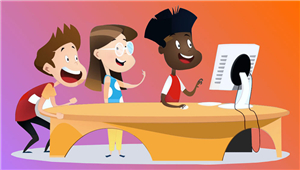Internet Safety: An Important Lesson to Kids
Internet safety
ALL TOPICS
- YouTube Parental Control
-
- How to see your YouTube history?
- Put parental controls on YouTube
- Delete TikTok Account without Phone Number
- Ways to block YouTube channels
- Ways to Get Somone's IP Address and Hide IP Address
- A complete guide on YouTube parental control
- Kids safe YouTube alternative
- Top 5 TikTok Alternatives
- Methods to restrict YouTube adult content
- Social Media App Parental Controls
- Parental Control Tips
Dec 12, 2025 Filed to: Parenting Tips Proven solutions
Internet safety for kids

Internet usage can be an exciting adventure for children especially for school research purposes, communication purposes with teachers, and play interactive games. Despite its benefits, online access has attracted various risks like inappropriate content, cyberbullying, harassment, and online predators.
Kids today are no longer safe! Scammers or predators who pose as kids or teenagers looking for friends have compromised kids’ websites and applications. These people lure children into revealing personal information (such as address and phone number). This is why Internet safety for kids should be excised.
What is internet safety?
Internet safety for kids or online safety is trying to be safe on the internet, knowledge of maximizing user's safety and security to private information and property associated with using the internet and protection from computer crime. The internet laws such as COPPA govern this.
Internet safety laws
A federal law, the Children's Online Privacy Protection Act (COPPA), helps protect children younger than 13 when they are online or web surfing. The main objective is to keep anyone from acquiring a child's personal information without the parents' consent.
This law requires websites to give an account of their privacy policies and get the parent to agree before collecting or accessing a child's personal information (such as an address, name, phone number, or Social Security number). COPPA restricts a given site from extorting more details than the required to play a game or enter a contest.
Why is internet safety important?
Laws on Internet safety for kids are designed to help maximize internet use by kids rather than blocking objectionable material. This will help them avoid the potential dangers that come with the internet. These dangers include:
- Cyberstalking – children using the internet without restriction face imminent attacks and harassment from individuals, groups, or organizations. Vice that comes along cyberstalking include threats, vandalism, solicitation for sex, or gathering personal information that may be used to threat or harass a child.
- Cyberbullying- a recent study conducted in the United States shows that cyberbullying has increased, with 23 percent o adolescents reported being a victim of cyberbullying, 30 percent of which reported experiencing suicidal behavior. Cyberbullying comes as a result of cyberstalking.
- Obscene/offensive content – various websites on the internet contain objectionable and explicit content, which is inappropriate for children. Hate speech, vulgar language, violence, nudity, and shock site are some of the inappropriate content.
- Online predation – child molesters, opportunists (rapist), or both roam freely on the internet where they target a child, lure him/her into engaging in inappropriate sexual relationships.
These are some of the dangers lurking out over the internet.
Internet safety facts and statistics
It is possible to be safe while on the internet, but first, some measures need to be put in place to avoid predators, bullies, hackers from acquiring your personal information that may be used to compromise a child's life.
95% of social media-using teens who have witnessed cruel behavior on social networking sites say they have seen others ignoring the mean response.
Here are some facts about Internet safety for kids:
- 42% of children ranging at the ages of 6-17 say that they have been exposed to nudity such as hardcore pornography while surfing on the internet.
- 29% of parents allow their children to use the internet without any restrictions or measures set aside to prevent bad online ethics.
- A study conducted by McAfee found that 87% of teenagers have been a victim of or witnessed cyberbullying.
- 1 out of 12 kids has had a conversation with strangers that were sexual oriented.
- 25 percent of children have or will pose as adults or older than they are while browsing online.
- 1 in 20 children will meet strangers online and proceed to arrange a covert meeting with them.
As children surf the internet, they may stumble upon inappropriate content or meet online predators. As more things are incorporated on the internet, it may be cumbersome to hide all harmful content to our children.
- Only 18% of young adults will use an online chat room currently. All internet-based sexually-based offenses begin in a chat room.
- Child pornography has surged in recent years with 80 million images of child pornography out on the internet, according to an analysis by the National Center for Missing and Exploited Children.
- The number of girls and boys being sexually victimized has rocketed to at least 200 million and 100 million, respectively.
- 4 in 10 online sexual solicitors online are under the age of 18 years.
It takes less than a minute, on average, for a predator to lure a potential victim.
Internet safety tips for kids
Ironically, the internet lists out some tools to help in curbing internet abuse. Many ISP's provide parental control. Parents ought to teach their kids safe and responsible online behavior and to monitor their Internet use and patterns.
Internet safety measures
The following basic guidelines should help the kids in creating a suitable online working platform while surfing the internet.
- Restrict specific sites per family rules. The Internet Service Provider sets some site restrictions.
- Teach kids to never reveal crucial personal information, such as an address, phone number, school name, or location.
- Monitor the child's activity on the internet and prevent posting or trading of personal pictures.
- Educate them on the dangers of sharing passwords with anyone other than parents. Show them how to use a screen name.
- Tell them never to respond to a threatening message, email, or post.
- Encourage the kids to report any conversation or encounter that was scary or demeaning to a trusted adult.
Parents should also play an active role in supervising internet activities. These include
- Spending time online with your kids and teaching them acceptable online behavior. Teach your kids to visit sites that are only beneficial to them.
- Save or bookmark kids' favorite sites for easy access.
- Play an active in ensuring that the school or institutions of learning have appropriate online protection tools. Try recommending the FamiSafe app.
- Take serious action on any report of abuse or uncomfortable exchange brought by the child.
- Check your credit card and phone bills for unfamiliar transactions.
Third-party applications like FamiSafe are ideal for Internet safety for kids. They help block access to sites and restrict personal information from being sent online. It can also monitor and track online activity hence ensures comfort for the child.
As the age of technology advances, internet applications continue to spread with the majority of businesses, education, and recreations at the peak. The use of the internet is rampantly growing, with everything being incorporate into the vast virtual ecosystem. Many daily activities are now internet dependent, day to day transactions require internet connection, social media, big technological companies also require internet to run.
Children with smartphones may need some privacy, which is normal, but make sure to talk about the sites and applications they use and their online experiences. Discuss with them the dangers of online interactions and warn them of harmful people who might want to take advantage of them and other Internet safety tips for kids.
Blaming everyone else for lack of internet safety today is easy, but do we ever consider that we are also to blame? It takes a short time for a child to be exploited or access something online that they should not have access to. A simple, corrupted ad, message, or post might be a game-changer to a child's life.
The internet has brought many positive changes and has eased the most cumbersome jobs.



Thomas Jones
chief Editor